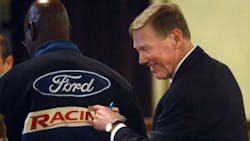Ford's Alan Mulally and the Superpower of Connection
In his TED Talk, Matthew Lieberman, a prominent social neuroscientist, describes human connection as a “superpower” because it makes people “smarter, happier and more productive.” Organizations that have cultures where people feel more connected experience higher levels of employee engagement, productivity and innovation.
A culture of connection played a prominent role in the miraculous turnaround of Ford Motor Co. starting in 2006, led by then-CEO Alan Mulally. In my book Connection Culture: The Competitive Advantage of Shared Identity, Empathy and Understanding at Work, I write about Mulally and other leaders in business, government and sports who have transformed uninspiring or dog-eat-dog cultures into sled dog teams that pulled together.
Connection culture is developed and maintained when leaders communicate an inspiring vision, value people and give them a voice.
An easy way to think of these elements is through this formula: Vision + Value + Voice = Connection.
Mulally shared with me the ways he used connection, a major part of his leadership style, to make a difference at Ford.
Communicate an inspiring vision. Mulally frequently used a phrase from founder Henry Ford: “opening the highways for all mankind.” He described Ford as giving people “freedom of mobility” so they can “access opportunities for growth.” He frequently spoke about the vision and factored it into decision-making, including in discussions to evaluate new product development priorities.
Ford’s newly designed F-150 pickup truck for 2015 fit the vision well. Its aluminum-based body made the best-selling pickup lighter, more fuel efficient and affordable.
“One Ford” was another phrase Mulally used to describe the plan to progress toward Ford’s vision. By communicating the plan, Mulally made the vision credible.
Takeaway: Remind people of how the work they do is helping others. Find phrases that are brief, memorable and inspiring, then repeat them often. In addition, communicate your plan so that everyone knows it and they know where your organization presently stands versus where it is headed.
Value people. Mulally says leaders need to love the people they lead. “Love” is not a word that is used much in manufacturing. By “love,” Mulally is basically saying you need to care about and value people in order to connect with them. So true.
Takeaway: Whether you use the word love or not, you need to value people as human beings and not think of them as mere means to an end. You also need to demonstrate this belief regularly in word and in deed. Show you value people as individuals by taking time to get to know their names, career aspirations and interests outside of work. Even simple gestures such as making eye contact and saying “hi” when you see them communicates your interest in them. Providing training or coaching to help them advance in their careers further shows that you care about them as individuals and want them to be able to succeed even beyond their current role with your company.
Give people a voice. Mulally gave people a voice by seeking their ideas and opinions, considering them and acting on the best ones. His primary vehicle for this was the Business Plan Review (BPR) meeting held for 2.5 hours every week. The BPR was attended in person or by teleconference by the global leadership team and all business and functional leaders.
During the BPR, operational goals were reviewed and problem areas identified so the group could collectively apply its knowledge to identifying solutions that got the plan back on track.
In the meetings, Mulally promoted a safe environment and honest dialogue. He also forbid humor at the expense of others because it undermined honesty and connection.
Takeaway: You can boost connection in your culture by sincerely seeking the ideas and opinions of the people you lead, especially on matters that are of interest to them and actions you are counting on them to implement. Be sure to follow up by recognizing them for their contributions.
Being intentional about connection with the people you lead will boost connection and performance—individually and among the people who work in your manufacturing operations—and help your employees and your company thrive.
Michael Lee Stallard is a thought leader and speaker on how effective leaders boost human connection in cultures to improve the health and performance of individuals and organizations. He is the author of Connection Culture and Fired Up or Burned Out. Connect with Michael at [email protected]
About the Author
Michael Lee Stallard
Michael Lee Stallard is a thought leader and speaker on how effective leaders boost human connection in cultures to improve the health and performance of individuals and organizations. He is the author of Connection Culture and Fired Up or Burned Out. Connect with Michael at [email protected]
